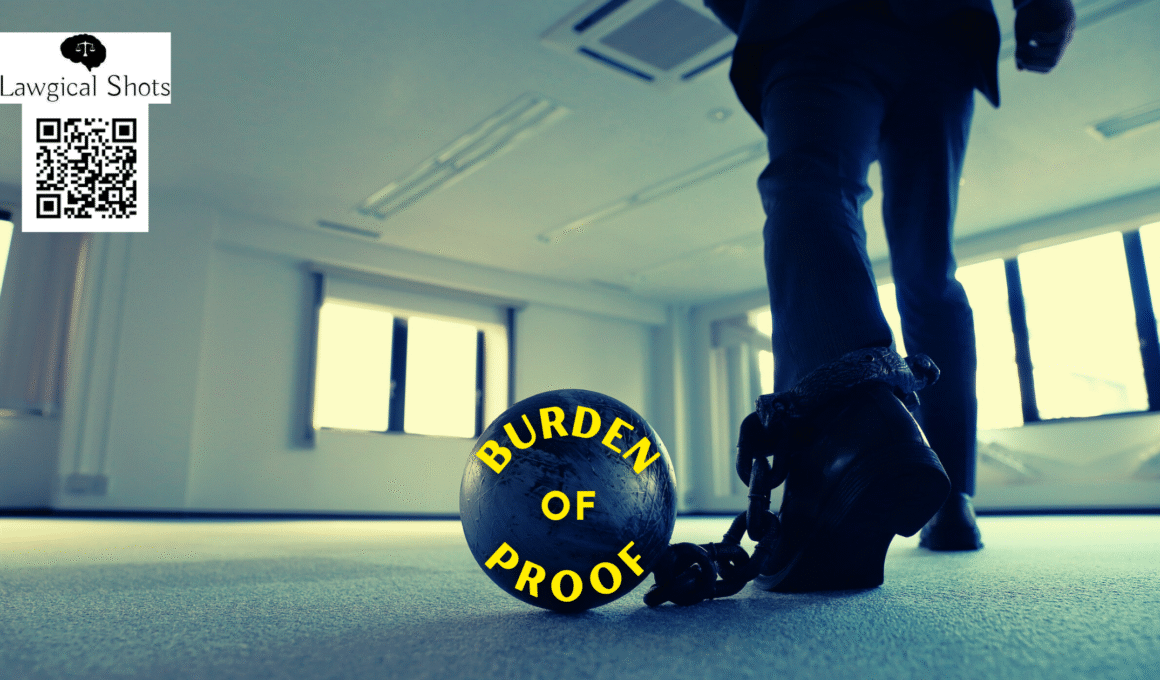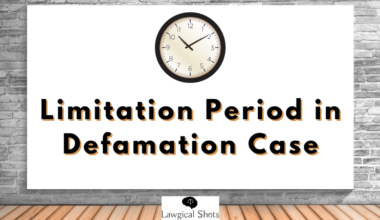What we see in movies is that trial starts soon after a crime is committed, and anyone can appear before the Court to present evidence. It only takes 2-3 hearings, and the Court keeps on taking evidence to eventually decide and pronounce their decision. That’s not how it works. What can be and cannot be accepted as evidence is stated in statutory laws. In fact, who can prove a specific aspect is also stated as Burden of Proof in Evidence Law. Here is a simplification of who has the burden to prove certain circumstances. There is further understanding of when the burden of proof shifts to another person. Let’s take a step-by-step look at the law on who needs to prove what before the Court of Laws.
What is burden of proof?
In a legal dispute, the burden to prove is the obligation on one party to prove their claims or allegations. Such claims need to be supported through evidence in the Court of Law. As per Section 104 of the BSA, the party which seeks the Court to give a judgment regarding a legal right or liability on asserted facts, needs to prove the existence of such facts. When bound by law to prove such facts, the burden of proof lies on that person/party.
In criminal cases, the burden to prove the case against the accused usually lies with the Prosecution. The said burden shifts to the accused in specific scenarios. In civil cases, the said burden of proof goes to the plaintiff who seeks a specific declaration on rights in his/her favour.
Burden of Proof in Evidence Act
While the new criminal laws are in force for quite some time, the colonial laws still remain on tips for most of us. The Indian Evidence Act, 1872 Part III, Chapter VII discussed the burden of proof. The various Sections of Evidence Act (101 to 114A) laid about shifts in burden of proof, and presumption in certain circumstances. The law related to presumption of dowry death was also provided under this Chapter.
Burden of Proof in Bharatiya Sakshya Adhiniyam
In the New Criminal Laws, Part IV Chapter VII of the BSA clarify the picture of burden of proof in evidence law. Sections 104 to 114 of BSA illuminate different scenarios and burden to prove. On the other hand, Sections 115 to 120 lay about presumption in specific circumstances.
Burden of proof Section in BSA is 104 if we focus upon the definition. However, as mentioned earlier, the provisions until Section 114 highlight the burden to prove in specific scenarios. The same have been simplified below.
Who has Burden of Proof?
As per Section 105, the burden of proof in evidence law lies with the one who would fail if no evidence is given on either side. This scenario is specific to a suit or proceeding. Hence, if it is about the Prosecution in a Criminal Court, the allegations are made against one or more accused. The version of Prosecution needs to be proved beyond reasonable doubt. Thus, most of the time, the burden of proof lies with the prosecution. Burden of proof in civil cases lies with the one who sues another, that is the plaintiff.
Burden to Prove Particular Fact
As per Section 106 of BSA, burden of proof shifts to the person who wants to prove a particular fact, regarding its existence. An exception to this aspect would be a law which provides that the factual proof shall lie on any particular person. For better understanding, if Priya alleges that Shweta committed trespass at her home, and Shweta claims that she was present at her workplace at the given time frame, it is Shweta’s responsibility to prove her presence at the workplace.
In case of one fact dependent upon another, the said dependent facts need to be proved accordingly. As per Section 107 of BSA, if Rajeev has to prove a dying declaration by Shashank, he also needs to prove Shashank’s death. In addition, Section 110 of BSA lays that if a person has been known to be alive within 30 years, the one who affirms that such person is dead must prove the death. To prove a person alive, who has not been heard of for 7 years, the burden of proof shifts to the one who affirms the person being alive as per Section 111.
Burden of Proof in General Exceptions
If someone claims that the case falls among the general exceptions in BNS, or any other exceptions, the circumstances need to be proved by the accused. The Court in such a case shall presume the absence of such circumstances. Hence, if Shanti claims that she was first attacked by the deceased person, and she exercised her right of private defense in retaliation, Shanti must prove it.
Burden to Prove Special Knowledge of Fact
As per Section 109 of the BSA, if a person claims to have special knowledge of a fact, the burden of proof in evidence law lies with him. For example, if someone has been caught travelling on a train without a ticket, it is upon that person to prove that he had a ticket.
Burden to Proof Legal Relationship
In cases where the question surrounds whether persons are partners, landlord-tenant, or principal and agent, and they have shown acting as such, the one who affirms that the relationship has ceased, will have to prove it. Hence, if an employee has worked for a company in the capacity of authorized signatory in cheque bounce case, and the company claims that he has ceased to be the authorized signatory, it is up to the company to prove it.
In case of good faith of transaction between parties in a position of active confidence, the burden of proving good faith lies with the one in such a position (Section 114 of BSA).
Presumption under BSA
Section 115 of Bharatiya Nyaya Sanhita discusses presumption in certain offences, in order to clarify the burden of proof. The provision lays that accused in specific offences being present in disturbed area place of public disorder, there is presumption of such accused person having committed such offence. The list of offences includes offences against the State like waging war, collecting armes, etc., criminal conspiracy, concealment of information related to waging war, etc.
Presumption of Paternity
While medical technology is used to determine paternity of a child, whether to or not to get the tests through a Court of law becomes a legal battle. Section 116 of the Bharatiya Sakshya Adhiniyam lays about birth during marriage as a conclusive proof of legitimacy. It states that a child born during continuance of a valid marriage, or within 280 days of its dissolution while the mother was unmarried, it serves as conclusive proof of legitimacy of the child with the man. The burden of proof in evidence law for paternity lies with the party who claims no access to each other to begotten such child.
Presumption in Death of Married Woman
The Bharatiya Sakshya Adhiniyam lays specific presumption in case a married woman dies. In such cases, the burden of proof in evidence law lies with the accused persons, if the circumstances are similar and doubtful.
Suicide by Married Woman
Section 117 of the BSA lays presumption by the Court regarding abetment of suicide by the husband and his relatives if a married woman commits suicide within 7 years of her marriage. This pertains to the question of suicide if it is shown that the woman was subjected to cruelty by her husband or his relatives. Cruelty here means the same as laid in Section 498A of Indian Penal Code, or Section 86 of the Bharatiya Nyaya Sanhita, 2023
Presumption of Dowry Death
Section 118 of BSA pertains to the question of whether a person committed dowry death of a woman, and it is shown that the woman was subjected to cruelty or harassment, in connection with dowry demands. In such situation, the Court shall presume against the accused person, that they committed dowry death. Thus, the burden of proof shifts upon those accused of causing dowry death, and not the Prosecution/Complainant.
Presumption of Certain Facts
Bharatiya Sakshya Adhiniyam Section 119 lays about Court to presume about the existence of specific facts likely to have happened in common course of natural events, human conduct and public and private business as connected to a particular case. The said presumption has been elaborated through various illustrations. The scenarios pertain to possession of stolen goods soon after theft, refusal to produce documents of importance, etc.
Presumption of Absence of Consent in Rape Case
As per the provision for rape in Bharatiya Nyaya Sanhita, free consent holds utmost value. If sexual intercourse is done with consent of the woman in her senses, it is not rape. Section 120 of BSA lays about presumption regarding absence of consent in prosecution for rape. If sexual intercourse by the accused is proved, and it is a question of consent of woman allegedly raped, who denies consent before the Court, the Court is bound by law to presume absence of consent.
Conclusion as to Burden of Proof in Evidence Law
Court trials can be complex, and as we can see, chapter VII of BSA laying about burden of proof and presumption specifies the scenarios when a person has burden to prove. It further clarifies when such burden of proof shifts to another person. While the general rule is that burden of proof lies with the Prosecution or Plaintiff/Petitioner, it may shift to the other party in specific circumstances, as per Bharatiya Sakshya Adhiniyam.








